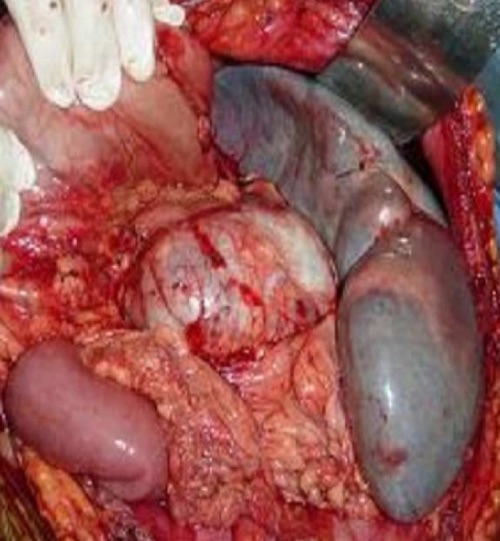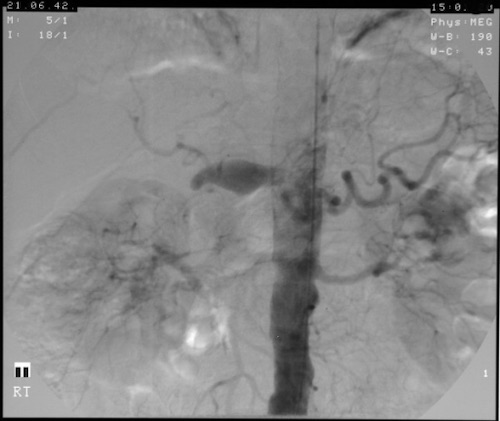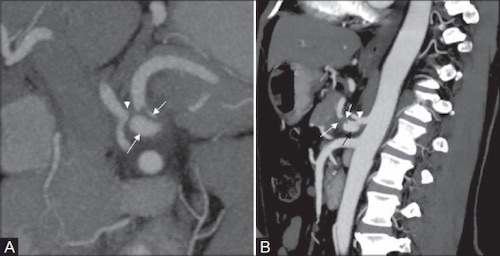Vascular: Splanchnic Artery Aneurysm
Splanchnic Artery Aneurysm
Basics
- Definition: 1.5x Dilation of a Splanchnic Artery
- Sites:
- Splenic Artery (60%) – Most Common
- Hepatic Artery (20%) – Second Most Common
- Celiac Artery
- Superior Mesenteric Artery
- Inferior Mesenteric Artery
- Gastroduodenal Artery
- Pancreaticoduodenal Artery
- Gastric Arteries
- Gastroepiploic Arteries
- One-Third Have an Additional Aneurysm Elsewhere
- Most Common Complication: Rupture
- Opposed to Thrombus/Emboli in Peripheral Aneurysms
- High Rupture/Mortality Risk in 3rd Trimester of Pregnancy
- Most Common Cause: Atherosclerosis
- SMA Aneurysms Most Commonly Mycotic Due to Infection
Splenic Artery Aneurysm
- True Aneurysm
- Most Common Visceral Aneurysm
- Most Common in Women
- High Mortality in Pregnancy
- Most Common in the Middle/Distal Portion
- “Double Rupture” Phenomenon:
- Herald Bleed into Lesser Sac Contained with Tamponade
- Then Rupture into Peritoneal Cavity
- Accounts for 20-30% of Presentations for Perforation
- May Also Be Seen in Celiac Artery Aneurysms
- If Repairing Give Splenic Vaccines Prior – Risk for Splenectomy
- Pseudoaneurysm
- Most Common Cause: Pancreatitis
Treatment Indications
- Size:
- Splenic Artery: > 2 cm
- Hepatic Artery: > 2 cm
- SMA: > 2.5 cm
- Celiac: > 2.5 cm
- Symptomatic
- Repair All Splenic Artery Aneurysms in Women Who are Pregnant or of Child-Bearing Age
- Pseudoaneurysm – Rapid Growth & High Risk of Rupture
- Repair All (High Rupture/Mortality Risk):
- Inferior Mesenteric Artery
- Gastroduodenal Artery
- Pancreaticoduodenal Artery
- Gastric Arteries
- Gastroepiploic Arteries
Treatment Options
- Rupture: Surgical Arterial Ligation
- Endovascular Approach (Generally Preferred if Able):
- Coil Embolization
- Most Common Endovascular Intervention
- Gastric/Gastroepiploic Arteries Require Both Proximal & Distal Embolization (May Recruit Retrograde Blood Supply)
- Stenting
- In Spleen, Only for Proximal Lesions – Too Tortuous for Distal Lesions
- Coil Embolization
- Surgical Approach:
- Aneurysmorrhaphy
- Ligation (With/Without Bypass)
- Resection

Splenic Artery Aneurysm 1

Hepatic Artery Aneurysm 2

Celiac Artery Aneurysm 3
References
- Ali S, Verma V, R S, Wani I. Giant splenic artery aneurysm: case report. ISRN Surg. 2011;2011:383450. (License: Creative Commons – Unspecified)
- Jaunoo SS, Tang TY, Uzoigwe C, Walsh SR, Gaunt ME. Hepatic artery aneurysm repair: a case report. J Med Case Rep. 2009 Jan 21;3:18. (License: CC BY-2.0)
- Rama Krishnan R, Murali K, Madan R, Francis G. CT imaging findings and endovascular management of isolated spontaneous dissecting aneurysm of celiac artery. Indian J Radiol Imaging. 2013 Jul;23(3):234-7. (License: CC BY-NC-SA-3.0)